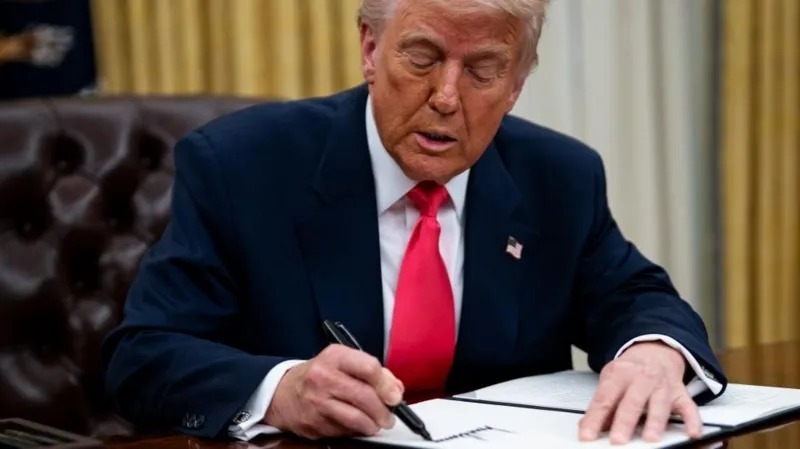
President Donald Trump has signed a trade agreement with the UK that implements parts of a pact agreed last month, reducing some barriers between the two countries.
The deal brings reduced tariffs on UK car exports to the US and removes levies on certain aerospace products, representing the first agreement announced by the White House since imposing wide-ranging tariffs earlier this year.
Under the agreement, the US will allow up to 100,000 UK cars to enter at a 10% tariff rather than the 25% rate imposed on all car imports previously. However, the deal maintains a 10% levy on most other UK goods and leaves steel tariff questions unresolved.
Prime Minister Sir Keir Starmer, speaking at the G7 summit in Canada, described the move as a “very important day” for both countries and called it a “sign of strength” between Britain and America.
Trump’s tariff policies have created global financial uncertainty, particularly affecting UK car manufacturers and steelmakers who depend heavily on US exports. When asked about steel tariffs, Trump said the UK was “very well protected” because “I like them,” but provided no specific timeline for clarification.
The steel issue remains complex. Current US taxes on UK steel and aluminium imports stand at 25%, with Britain temporarily spared from Trump’s recent doubling of steel tariffs to 50%. However, the UK faces a July 9 deadline to reach an agreement or potentially face increased rates.
Steel qualification rules require products to be “melted and poured” in the exporting country. This creates challenges for the UK after Tata Steel closed its blast furnaces last year and began importing steel while transitioning to electric furnace operations.
Transport Secretary Heidi Alexander acknowledged continued work needed on steel, stating they want to reduce the current 25% tariff further. UK Steel head Gareth Stace emphasized the industry’s need for clarification on the “melted and poured” requirement and available quotas.
The agreement includes additional provisions affecting other sectors. The UK has granted tariff-free status to 1.4 billion litres of US ethanol, replacing the previous 19% tariff. However, ABF Sugar, which operates the UK’s largest bioethanol plant, has warned of potential job cuts affecting 200 positions at its Hull facility if government support isn’t secured by June 25.
ABF Sugar chief executive Paul Kenward criticized the arrangement, saying “the government’s given away the entire UK market for bio-ethanol” and warned of significant stakes for the industry’s future.
The deal also eliminates the UK’s 20% tariff on US beef imports while raising the quota to 13,000 tonnes. The government maintains that all imports must meet existing food safety requirements without weakening standards.
Business and Trade Secretary Jonathan Reynolds committed to updating parliament on quota implementation for US beef and ethanol as part of the agreement’s obligations.
Despite government celebration alongside other trade deals with the EU and India, this agreement is more limited than the comprehensive free-trade deal long discussed. The scope appears more restricted than initially outlined last month.
While Trump has characterized the pact as a “major trade deal,” it technically isn’t one, as the US president lacks the authority to sign free-trade agreements without Congressional approval.
The deal has faced political criticism in the UK. Conservative leader Kemi Badenoch dismissed it as a “tiny tariff deal,” while Liberal Democrat Treasury spokesperson Daisy Cooper demanded the government “come clean” on details, including publishing impact assessments on effects for British farmers, food standards, and the steel industry.












Be the first to leave a comment